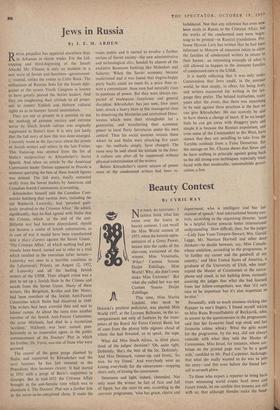Jews in Russia
By J. E. M. ARDEN ACIAL prejudice has appeared elsewhere than in Arkansas in recent weeks. For the kid- napping and third-degreeing of the Israeli Attaché Mr. Chazan is only an incident in a new wave of Soviet anti-Semitism—government- s; msored, unlike the events in Little Rock. The enthusiasm of Russian Jews for the Israeli dele- gation at the recent Youth Congress is known to have greatly peeved the Soviet leaders. And they are toughening their attitude to all propo- sals to restore Yiddish and Hebrew cultural rights So as to hamper forced assimilation.
They are not at present in a position to use the methods of cxtreme secrecy and extreme terror by which Jewish culture was originally suppressed in Stalin's time. It is only just lately that the full story of how this was done emerged. I recently wrote in the Spectator about the arrests of Jewish writers and others in the late Forties. This frame-up was omitted from the list of Stalin's malpractices in Khrushchev's Secret Speech. And when an article by the American Communist leader Dennis appeared in Pravda a sentence querying the fate of these Jewish figures was deleted. The full story, finally extracted orally from the Soviet leaders by American and Canadian Jewish Communists, is revealing.
Khrushchev himself told the Canadian Com- munist Solzberg that various Jews, including the old Bolshevik Lozovsky, had 'perished guilt- lessly involved in the Crimean Affair.' He added, significantly, that he had agreed with Stalin that the Crimea, which 'at the end of the anti- Hitlerite war had become depopulated, should not become a centre of Jewish colonisation, as in case of war it would have been transformed into a place d'artnes against the Soviet Union.' The Crimean Affair,' of which nothing had pre- viously been heard, turned out to refer to a trial which resulted in the execution (after torture- Lozovsky was seen in a horrible condition in the Lefortovsky Prison), on August 12, 1952, of Lozovsky and all the leading Jewish writers of the USSR. Their alleged crime was a plot to set' up a Jewish State in the Crimea and secede from the Soviet Union. Many of these writers, like Bergelson, Kvitko and Der Nister, had been members of the Jewish Anti-Fascist Committee which Stalin had dissolved in 1949. The writers had been arrested then and sent to labour camps. At about the same time another member of the Jewish Anti-Fascist Committee, the actor Mikhoels, had died in a mysterious 'accident.' Mikhoels, was later named post- humously as an imperialist agent, in the public announcement of the Doctors' Plot in which his brother, Dr. Vovsi, was one of those who were accused.
The course of the great purge planned by Stalin, and supported by Khrushchev and the novi hombres he has just restored to the Presidium, thus becomes clearer: It had started in 1951 with a purge of Beria's supporters in Georgia. But in mid-1952 the Crimean Affair brought in the anti-Semitic tone which was to -dominate it. The Doctors' Plot was a further link in the never-to-be-completed chain. It made the issues public and it started to involve a further section of Soviet society—the new administrative and technological elite, headed by alumni of the exclusive Baumann Institute like Malenkov and Saburov. When the Soviet economy became modernised and it was found that dogma-happy party hacks could no more fix a price than re- wire a commutator, these men had naturally risen to positions of power. But they were always sus- pected of inadequate fanaticism and general discipline. Khrushchev has just now, four years later, struck a heavy blow at this managerial class by dissolving the Ministries and centralised Direc- torates which were their strongholds for a generation, and transferring their economic power to local Party Secretaries under his own control. Thus his social enemies remain those whom he and Stalin were attacking five years ago: his methods, simply, have changed. The same may be said about his attitude to the Jews. A culture can after all be suppressed without physical extermination of the writers.
Before Khrushchev's recent seizure of power most of the condemned writers had been re- habilitated. Not that any reference has even now been made in Russia to the Crimean Affair, but the works of the condemned men were begin- ning to be printed—in Russian translations. Pro- fessor Hyman Levy has written that he had been informed in Moscow of measures taken to allow the families of condemned writers to return to their homes : an interesting example of what is still allowed to happen to the innocent families of condemned men in the USSR.
It is worth reflecting that it was only under Communism that Jews could, in the postwar world, be shot simply, in effect, for being Jews, and writers massacred for writing in the lan- guage they prefer. The belated realisation, manY years after the event, that there was something to be said against these practices is the best we can give Khrushchev. He can scarcely be said to have shown a change of heart. If he no longer feels he can get away with thuggery pure and simple it is because the Russian population, and even some of the Communists in the West, have shown that they are unwilling to take Ivan the Terrible methods from a False Demetrius, But the outrage on Mr. Chazan shows that Serov and he have nothing in principle against going back to the old strong-arm techniques, especially when faced with that intolerable, unassimilable provo- cation, a Jew.


































 Previous page
Previous page